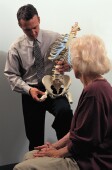
WEDNESDAY, Jan. 20 (HealthDay News) — A new gene involved in a recessive form of brittle bone disease has been pinpointed by researchers.
The gene is the third to be identified in a sequence of genes involved in previously unexplained forms of osteogenesis imperfecta, a sometimes fatal genetic condition that weakens bones, resulting in frequent fractures.
The new gene, discovered by U.S. National Institutes of Health researchers and their colleagues, is involved in the production of Cyclophilin B, which is part of a complex of three proteins that folds collagen into a precise molecular configuration before it’s secreted from cells.
Collagen acts as the molecular scaffolding that holds together bone, tendons, skin and other tissues.
Most types of osteogenesis imperfecta are the result of a dominant mutation in collagen itself, requiring only one copy of the mutated gene to cause the condition, the researchers explained in an NIH news release. Osteogenesis imperfecta involving the Cyclophilin B gene is a recessive trait, requiring two defective copies of the gene to cause the disorder.
Identification of this new gene “provides insight into a previously undescribed form of osteogenesis imperfecta. The advance also provides new information on how collagen folds during normal bone formation, which may also lead to greater understanding of other bone disorders,” Dr. Alan E. Guttmacher, acting director of the NIH’s Eunice Kennedy Shriver National Institute of Child Health and Human Development, said in the news release.
The study is published in the Jan. 20 issue of the New England Journal of Medicine.
More information
The American Academy of Orthopaedic Surgeons has more about osteogenesis imperfecta.

